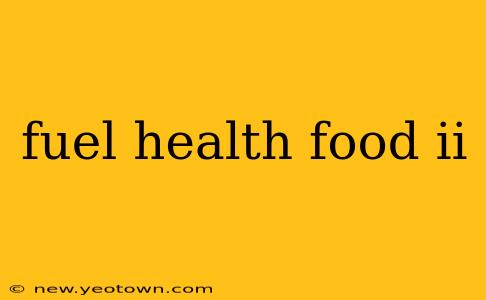Fueling Your Body: The Ultimate Guide to Health Foods (Part II)
In Part I of this series, we laid the groundwork for understanding the importance of fueling your body with the right foods. This time, we’re diving deeper into specific food groups and providing practical advice on incorporating them into your daily diet. Think of this as your personalized roadmap to a healthier, more energetic you.
What are the best foods for sustained energy?
This is a question many ask, and the answer isn't a single magic bullet. Sustained energy comes from a balanced diet rich in complex carbohydrates, healthy fats, and lean protein. Forget the sugary rush and crash; we’re aiming for a steady stream of fuel. Think whole grains like quinoa and oats for slow-releasing energy, paired with nuts and seeds for healthy fats that keep you satiated. Lean protein, like chicken breast or fish, will help maintain muscle mass and keep your energy levels stable throughout the day.
What are some examples of healthy snacks for energy?
Let's face it, we all need a little pick-me-up sometimes. But ditch the processed snacks! Instead, opt for nutrient-dense options. A handful of almonds or walnuts provides healthy fats and protein. Greek yogurt with berries offers protein and antioxidants. A piece of fruit, like an apple or banana, provides natural sugars for a quick energy boost. Preparing these snacks in advance can help you avoid unhealthy impulse choices when hunger strikes.
How can I incorporate more fruits and vegetables into my diet?
This is where creativity comes in! Don't just stick to the same old salad. Experiment with different cooking methods – roast vegetables for a delicious side dish, add spinach to your omelet, blend fruits into smoothies, or enjoy a vibrant vegetable stir-fry. Make it a habit to include at least one serving of fruits and vegetables with each meal. The more colorful your plate, the more varied your nutrients will be!
What are some healthy alternatives to processed foods?
Processed foods often lack essential nutrients and are packed with unhealthy fats, sugars, and sodium. Fortunately, there are plenty of delicious alternatives. Instead of reaching for a processed snack, make your own trail mix with nuts, seeds, and dried fruit. Swap out sugary cereals for oatmeal with berries and nuts. Prepare your own lunch instead of grabbing fast food. It might seem like more work initially, but the long-term benefits to your health and energy levels are immeasurable.
What are the benefits of eating whole grains?
Whole grains are your best friend when it comes to sustained energy. Unlike refined grains, which are stripped of their nutritional value, whole grains retain their fiber, vitamins, and minerals. This fiber is crucial for digestion and helps regulate blood sugar levels, preventing those energy crashes. Examples include brown rice, whole wheat bread, and quinoa. Including whole grains in your diet promotes better gut health and provides you with a more consistent energy supply.
How can I plan healthy meals for the week?
Planning is key to healthy eating. Take some time each week to plan your meals and create a grocery list. This will prevent impulsive unhealthy food choices and ensure you have the ingredients you need to prepare nutritious meals. Consider batch cooking – preparing larger quantities of healthy meals on the weekend and freezing portions for the week ahead. This will save you time and effort during the busy week.
Remember, fueling your body with healthy foods is a journey, not a race. Small, consistent changes can make a big difference in your overall health and well-being. Listen to your body, enjoy the process, and celebrate your progress along the way.

